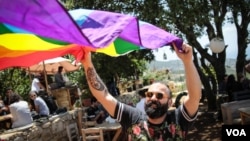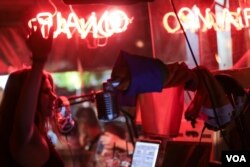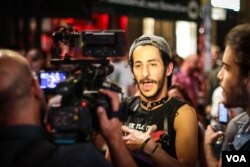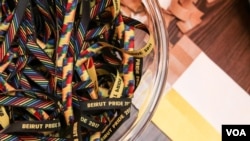The rainbow flags have once again disappeared from public view, but in a week that saw the launch of Beirut Pride, hopes are that a week of LGBTQI activism may be felt for a long time to come in Lebanon.
In a country often regarded as socially liberal compared to its Arab neighbors, conservative social values remain deeply embedded among many, with LGBTQI Lebanese facing widespread discrimination.
But at the end of a week that — amid threats and pressure — saw events take place not just in conference halls but the streets, bars and cafes of Beirut, there are hopes that a push into the public spotlight offered by the newly launched Beirut Pride platform could further drive change.
"It is like you are in a plane about to skydive for the first time," said LGBT activist Lea Freiha, "and you are looking over the edge. You get super afraid of jumping, but when you do it's the most exhilarating thing."
Freiha spoke to VOA in front of Radio Beirut, one of about 20 bars in the city's hip Mar Mikhael district to fly the pride flag for a public party on Saturday night as part of Beirut Pride.
Held near the end of a week of activism, it followed everything from drag shows to movie screenings and panel discussions.
It also carried with it the all-too-familiar danger of retribution, with two major events held by prominent LGBTQI NGOs already canceled amid threats.
'Totally universal' message
NGOs in Lebanon have campaigned for years for improved rights, but Beirut Pride emerged separately as the brainchild of Hadi Damien, who was inspired having seen similar events in both Prague and Amsterdam.
"We're not coming with an attempt to be provocative or aggressive at all," said Damien, adding that the idea was to communicate what he called a "totally universal" anti-discriminatory message over the course of the week.
To the chagrin of some, Damien's vision for the event focused more on collaborating more with the creative industries than with NGO's — an attempt, he told VOA, to be more creative and less politicized.
His efforts involved a balancing act between pushing the LGBTQI community into the public realm and an awareness of the potential security risks such steps carry — risks that became all to evident last week.
An event due to be held by NGO Proud Lebanon last Sunday was canceled by the venue amid threats by a Salafist group called The League of Muslim Scholars — echoing last year's cancellation after complaints from a Christian group.
Meanwhile, an annual conference by nonprofit Helem to mark International Day Against Homophobia, Transphobia and Biphobia (IDAHOT) on May 17 was also pulled amid rumors of warnings by the government over unspecified threats.
Turning tides
Attempts to quash LGBTQI events come in the context of ongoing and institutionalized discrimination against Lebanon's wider LGBTQI community.
A 2015 report by advocacy group Helem revealed that 81.2 percent of Lebanese polled disagreed that homosexuality was normal and natural.
Fears of harassment from the public and authorities remain widespread, while an article of Lebanese penal law that prohibits sexual acts that "contradict the laws of nature" have been used to prosecute members of the LGBTQI community.
In recent years, however, judges have issued rulings challenging this use of Article 534, while public attitudes are thought to be slowly shifting.
Georges Azzi, who co-founded Helem in 2004, and is now executive director of Arab Foundation for Freedoms and Equality, saw many reasons to be positive.
"The support offered in the wake of the canceled events [during Beirut Pride] was overwhelming," he said.
Although the LGBTQI community has been active in Lebanon for years, Beirut Pride has brought different initiatives under one name and given "much more visibility" to the cause, Azzi added.
Meanwhile, Damien is planning for next year's event and is determined that it can act as a vehicle for change.
Efforts by VOA to speak to government figures about Beirut Pride elicited no response, and while soldiers were present for Saturday's event in Mar Mikhael, some questioned the lack of security offered to NGOs for events that were canceled.
Damien was quick to point out, however, that the government had given Beirut Pride the green light.
"If these people had an issue with it, they could have stopped it," he added.
Taking hope
Back on the streets of Mar Mikhael, as the Pride party got into full swing, Lea Freiha acknowledged that such events would be impossible in many parts of Lebanon. As an out-and-proud lesbian, she added life would continue to present her with its share of struggles.
Yet in looking around at the crowds filling the bars and spilling out onto streets, Freiha took hope.
"I thought people would be closeted or scared to come out, attend and raise awareness of the cause. I didn't expect this," she said.








